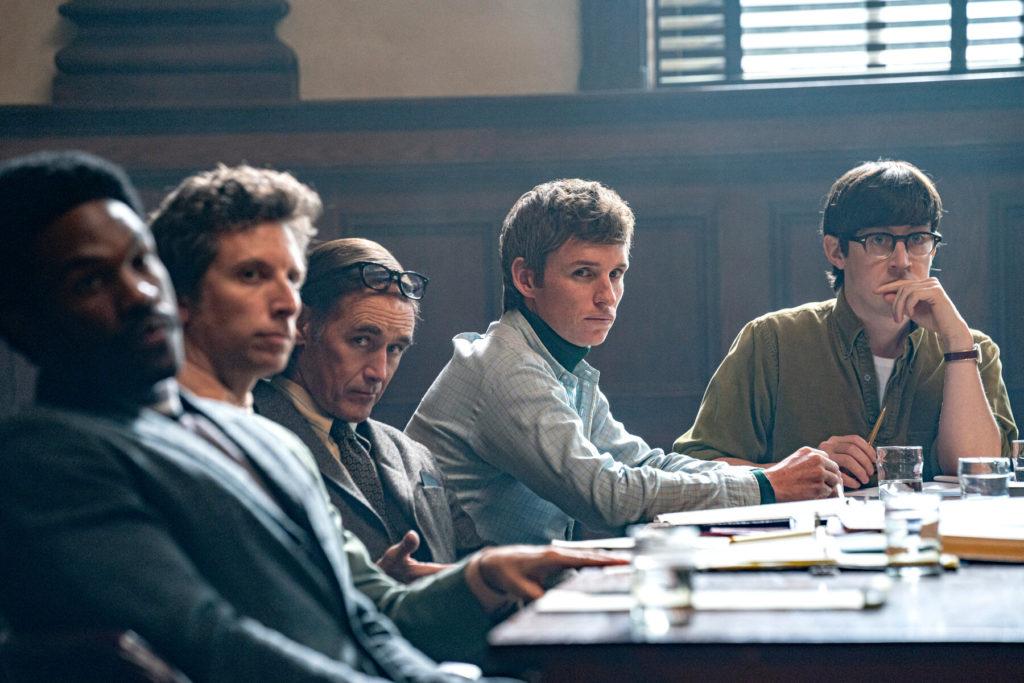The year is 1968. Youth in the United States are engaged in a cultural revolution as the country is preparing for its worst year. On one hand, the nation is fighting a seemingly endless war, and, on the other, gearing up for a major election. Sound familiar? Aaron Sorkin — writer and director of Netflix’s “The Trial of the Chicago 7” — wants viewers to think so.
“The Trial of the Chicago 7” is a narrative recount of the court case that ensued five months after rioting broke out at the 1968 Democratic National Convention in Chicago. The government charged eight men — Abbie Hoffman (Sacha Baron Cohen), Tom Hayden (Eddie Redmayne), Jerry Rubin (Jeremy Strong), David Dellinger (John Carroll Lynch), Rennie Davis (Alex Sharp), John Froines (Daniel Flaherty), Lee Weiner (Noah Robbins) and Bobby Seale (Yahya Abdul-Mateen II) — with conspiracy to cross state lines to incite violence. Bobby, one of the founding members of the Black Panther Party, eventually had his trial severed because of contempt of court, lowering the number to seven defendants.
In the politically charged climate of the 2020s, the story on the surface feels more relevant than ever. These men are not just defending their names. With the whole country watching, they are defending the image of young peoples’ rights to protest in the U.S. However, this air of importance is immediately squandered by Sorkin’s generic screenplay.
By now, Sorkin’s name should be synonymous with courtroom drama, having written “A Few Good Men” and a stage adaptation of Harper Lee’s “To Kill a Mockingbird.” Yet “The Trial of the Chicago 7” uses stereotypes of 60s youths as hippies and the government as corny villains, stripping the film of any depth. The protagonists, or the defense, have nothing to overcome when the audience is never shown what they are fighting for — and thus what they stand to lose. They stand up in court, recite pathos-filled speeches as triumphant string music slowly crescendos until the courtroom claps with satisfaction.
The film mistakes this gaudy self-importance as inherent relevance. Sorkin relies on a detached centrist angle, unwilling to take a stand alongside the Chicago Seven. The script is committed to staying away from picking sides. The resulting plot deflates any meaningful political messaging. In a story of real people and their actual fates, Sorkin fails to leave the viewers with anything to chew on. The film is uninterested in why the trial of the Chicago Seven was so important for the country, as well as what it meant for the country heading into the 70s. With a focus on solely the court case, much of the compelling historical context is missing.
For many audience members, just the words “courtroom drama” are an automatic snooze button, and this film does not revolutionize the genre. Sorkin is an inexperienced director, with his only other credit being the 2017 film “Molly’s Game.” This film would play fine as a stage play because it lacks cinematic flair and is marked by an unimaginative presentation. Flat, overly lit wide shots and men standing around in suits, intermittently raising their voices, dominate the screen. The camera seems to forgo close-ups that would reveal emotion or minutiae that would differentiate these characters.
The film is able to wrangle one stellar performance. Abdul-Mateen II’s powerful depiction of Bobby embodies the unfair treatment the justice system gives to people of color. Although he was not given much screen time to shine, when present, he commands a presence and leaves a strong impression.
There are many films with important political messages, but “The Trial of the Chicago 7” is an insincere attempt by a Hollywood elite to become one of them. As a screenwriter, Sorkin is neither out of touch with cultural issues nor untalented. But with “The Trial of the Chicago 7” he is unconcerned with all the empathy, gusto and respect this story deserves. This leads to a critical moment in the country’s history being turned into an uninspired and monotonous drama.




















